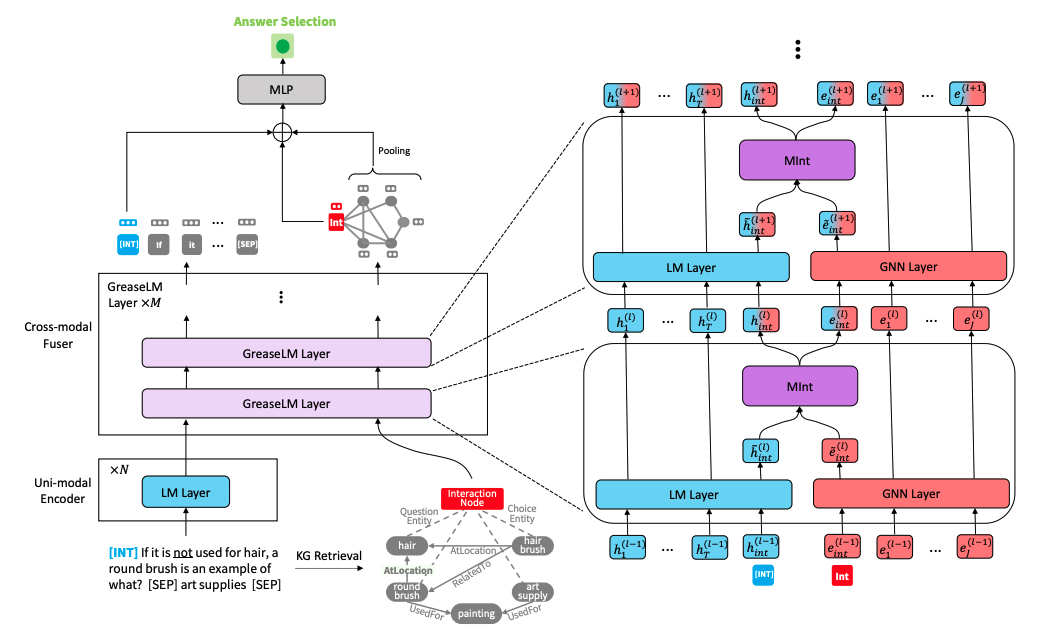This repo provides the source code & data of our paper GreaseLM: Graph REASoning Enhanced Language Models for Question Answering (ICLR 2022 spotlight).
- Python == 3.8
- PyTorch == 1.8.0
- transformers == 3.4.0
- torch-geometric == 1.7.0
Run the following commands to create a conda environment (assuming CUDA 10.1):
conda create -y -n greaselm python=3.8
conda activate greaselm
pip install numpy==1.18.3 tqdm
pip install torch==1.8.0+cu101 torchvision -f https://download.pytorch.org/whl/torch_stable.html
pip install transformers==3.4.0 nltk spacy
pip install wandb
conda install -y -c conda-forge tensorboardx
conda install -y -c conda-forge tensorboard
# for torch-geometric
pip install torch-scatter==2.0.7 -f https://pytorch-geometric.com/whl/torch-1.8.0+cu101.html
pip install torch-cluster==1.5.9 -f https://pytorch-geometric.com/whl/torch-1.8.0+cu101.html
pip install torch-sparse==0.6.9 -f https://pytorch-geometric.com/whl/torch-1.8.0+cu101.html
pip install torch-spline-conv==1.2.1 -f https://pytorch-geometric.com/whl/torch-1.8.0+cu101.html
pip install torch-geometric==1.7.0 -f https://pytorch-geometric.com/whl/torch-1.8.0+cu101.htmlPreprocessing the data yourself may take long, so if you want to directly download preprocessed data, please jump to the next subsection.
Download the raw ConceptNet, CommonsenseQA, OpenBookQA data by using
./download_raw_data.sh
You can preprocess these raw data by running
CUDA_VISIBLE_DEVICES=0 python preprocess.py -p <num_processes>
You can specify the GPU you want to use in the beginning of the command CUDA_VISIBLE_DEVICES=.... The script will:
- Setup ConceptNet (e.g., extract English relations from ConceptNet, merge the original 42 relation types into 17 types)
- Convert the QA datasets into .jsonl files (e.g., stored in
data/csqa/statement/) - Identify all mentioned concepts in the questions and answers
- Extract subgraphs for each q-a pair
The script to download and preprocess the MedQA-USMLE data and the biomedical knowledge graph based on Disease Database and DrugBank is provided in utils_biomed/.
For your convenience, if you don't want to preprocess the data yourself, you can download all the preprocessed data here. Download them into the top-level directory of this repo and unzip them. Move the medqa_usmle and ddb folders into the data/ directory.
The resulting file structure should look like this:
.
├── README.md
├── data/
├── cpnet/ (prerocessed ConceptNet)
├── csqa/
├── train_rand_split.jsonl
├── dev_rand_split.jsonl
├── test_rand_split_no_answers.jsonl
├── statement/ (converted statements)
├── grounded/ (grounded entities)
├── graphs/ (extracted subgraphs)
├── ...
├── obqa/
├── medqa_usmle/
└── ddb/
To train GreaseLM on CommonsenseQA, run
CUDA_VISIBLE_DEVICES=0 ./run_greaselm.sh csqa --data_dir data/
You can specify up to 2 GPUs you want to use in the beginning of the command CUDA_VISIBLE_DEVICES=....
Similarly, to train GreaseLM on OpenbookQA, run
CUDA_VISIBLE_DEVICES=0 ./run_greaselm.sh obqa --data_dir data/
To train GreaseLM on MedQA-USMLE, run
CUDA_VISIBLE_DEVICES=0 ./run_greaselm__medqa_usmle.sh
You can download a pretrained GreaseLM model on CommonsenseQA here, which achieves an IH-dev acc. of 79.0 and an IH-test acc. of 74.0.
You can also download a pretrained GreaseLM model on OpenbookQA here, which achieves an test acc. of 84.8.
You can also download a pretrained GreaseLM model on MedQA-USMLE here, which achieves an test acc. of 38.5.
To evaluate a pretrained GreaseLM model checkpoint on CommonsenseQA, run
CUDA_VISIBLE_DEVICES=0 ./eval_greaselm.sh csqa --data_dir data/ --load_model_path /path/to/checkpoint
Again you can specify up to 2 GPUs you want to use in the beginning of the command CUDA_VISIBLE_DEVICES=....
Similarly, to evaluate a pretrained GreaseLM model checkpoint on OpenbookQA, run
CUDA_VISIBLE_DEVICES=0 ./eval_greaselm.sh obqa --data_dir data/ --load_model_path /path/to/checkpoint
To evaluate a pretrained GreaseLM model checkpoint on MedQA-USMLE, run
INHERIT_BERT=1 CUDA_VISIBLE_DEVICES=0 ./eval_greaselm.sh medqa_usmle --data_dir data/ --load_model_path /path/to/checkpoint
- Convert your dataset to
{train,dev,test}.statement.jsonlin .jsonl format (seedata/csqa/statement/train.statement.jsonl) - Create a directory in
data/{yourdataset}/to store the .jsonl files - Modify
preprocess.pyand perform subgraph extraction for your data - Modify
utils/parser_utils.pyto support your own dataset
This repo is built upon the following work:
QA-GNN: Question Answering using Language Models and Knowledge Graphs
https://github.com/michiyasunaga/qagnn
Many thanks to the authors and developers!
